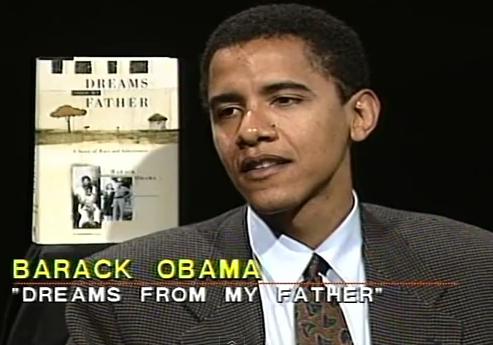To the media, Barack Obama was a “post racial” president who symbolized the best of racial progress. The Economist called his election a “post-racial triumph,” the New Yorker lauded the “post-racial” millennials who had elected him, and the late Daniel Schorr of NPR celebrated what his “post-racial” election meant for the American character.
But was Obama really post-racial, or was the media pulling a fast one on us? Let’s go straight to the source– to Barack Obama, circa 1995. In late August 1995, Obama sat for an interview with Monice Mitchell of the Hyde Park Herald for the promotion of his then-new book, Dreams From My Father. In the interview, far from his post-racial image, Obama stereotyped blacks and whites alike.
Obama claimed that he “did what most young black men do” by abusing drugs to deal with perceived alienation. We know, from David Maraniss’s book Barack Obama: The Story, that his “Choom Gang” of pot- smoking buddies in Hawaii had been largely white, wealthy and privileged. But in 1995, Obama was trying to create what he imagined to be a racially “authentic” past.
I gave in to the stereotypes, the anger. My situation was different, though, because unlike most African Americans, I have direct connection to my white blood. I could see it. I could touch it,” said Obama, who teaches a civil rights course at the University of Chicago. “It was tough balancing my anger as a black man and love for my mother and her family, but I never pushed them away.”
That is, until Obama ran for president and threw his white grandmother–a “typical white person,” in his criticism of her supposed racism–under the bus.
Obama’s “white blood” comment should be seen in context. The whole concept of blood being connected to race is archaic, at best, and racialist at worse. But Obama once indulged in it often. Malcolm X’s Autobiography “spoke” to the young Obama. Malcolm X “spoke of a wish he’d once had, the wish that the white blood that ran through him, there by an act of violence, might be expunged,” wrote Obama. Obama continued: “I knew…that traveling down the road to self-respect my own white blood would never recede into mere abstraction.”
In the 1980s and 1990s, Obama drew his inspiration from the progressive, black mayor Harold Washington, whose career he emulated. He told Mitchell about how he had finally found himself in black Chicago where he worked as a community organizer (a job he had been hired to do partly because he was black, according to Maraniss’s biography):
My identity problems began to mesh once I started working on behalf of something larger than myself,” he said. “Through this work, I could be angry about the plight of African Americans without being angry at all white folks.”
It’s clear that Obama wanted to use Dreams to talk about race–and to aim for political aspirations:
“I got a lot of publicity after I was elected president of the law review and publishers approached me about writing a book about my experiences at Harvard, but I didn’t think that would be interesting. I wanted to write about race relations,” said Obama… “Originally, I think the book was probably sitting there in me, but I wasn’t thinking about it in that way.” [Ellipses in original, emphasis mine]
His book on race relations was to be his ticket to elected office in Hyde Park and the South Side of Chicago– and to the hearts of black and white liberals alike.

COMMENTS
Please let us know if you're having issues with commenting.